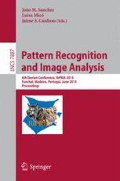Abstract
In this paper we propose a new method to discriminate cognitive brain states directly from functional Magnetic Resonance Images (fMRI). First, we apply Robust Principal Component Analysis (RPCA) to construct low dimensional linear-subspace representations from the noisy fMRI images for each subject and then perform a Gaussian Naive Bayes (GNB) classification. In previous studies the discrimination of cognitive brain states from fMRI is done by transforming the fMRI into a time sequence of voxels from which the brain states are inferred. RPCA improved the classification rate of a real benchmark fMRI data.
Access this chapter
Tax calculation will be finalised at checkout
Purchases are for personal use only
Preview
Unable to display preview. Download preview PDF.
References
Friston, K.J.: Introduction to statistical parametric mapping. In: Frackowiak, et al. (eds.) Human Brain Function (2003)
Mitchell, T., Hutchinson, R., Niculescu, R., Pereira, F., Wang, X.: Learning to Decode Cognitive States from Brain Images. Machine Learning 57, 145–175 (2004)
Hutchinson, R., Niculescu, R., Keller, T., Rustandi, I., Mitchell, T.: Modeling fMRI data generated by overlapping cognitive processes with unknown onsets using Hidden Process Models. NeuroImage 46, 87–104 (2009)
De la Torre, F., Black, M.: Robust Principal Component Analysis for Computer Vision. In: IEEE Int. Conf. on Computer Vision, Vancouver, Canada (2001)
Keller, T., Just, M., Stenger, V.: Reading span and the time-course of cortical activation in sentence-picture verification. In: Annual Convention of the Psychonomic Society, Orlando, FL (2001)
Author information
Authors and Affiliations
Editor information
Editors and Affiliations
Rights and permissions
Copyright information
© 2013 Springer-Verlag Berlin Heidelberg
About this paper
Cite this paper
Georgieva, P., Nuntal, N., De la Torre, F. (2013). Robust Principal Component Analysis for Improving Cognitive Brain States Discrimination from fMRI. In: Sanches, J.M., Micó, L., Cardoso, J.S. (eds) Pattern Recognition and Image Analysis. IbPRIA 2013. Lecture Notes in Computer Science, vol 7887. Springer, Berlin, Heidelberg. https://doi.org/10.1007/978-3-642-38628-2_19
Download citation
DOI: https://doi.org/10.1007/978-3-642-38628-2_19
Publisher Name: Springer, Berlin, Heidelberg
Print ISBN: 978-3-642-38627-5
Online ISBN: 978-3-642-38628-2
eBook Packages: Computer ScienceComputer Science (R0)

